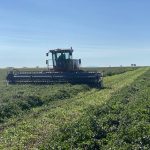CNS Canada — The cash barley market in the strategically important area of Lethbridge, Alta. is under pressure right now because of weather issues and a delayed harvest, industry watchers said.
“The market is under a bit of pressure but we’re not getting hit with any great volume yet,” said Allen Pirness, senior trader at MarketPlace Commodities in Lethbridge.
Prices for barley are hanging around $160 per tonne, according to Pirness. That’s down $20 from a month ago but almost exactly where prices stood last year at this time.
Read Also

U.S. grains: Soybean prices rise as China-U.S. truce assessed
Chicago soybean prices rose on Wednesday, recovering some of the previous session’s losses, as Beijing’s confirmation that it was cutting tariffs on U.S. farm goods put attention back on a trade truce between the countries.
“It was around $155,” he said.
Last year values rallied after the harvest was over; Pirness said that could happen again this year but it’s tough to know for sure. Other forces could influence its direction, he said.
“I think feed wheat again is going to determine the course of direction for the barley market.”
Feed wheat, he explained, is holding up a little higher than barley right now, with prices “in the $170s at the moment.”
As producers assess whether their grain has sprouted or downgraded, things will become clearer, he said. Frost damage will play a role in determining how much feed wheat comes onto the market.
Meanwhile, rail logistics have kept corn from making its way into the Lethbridge market in any great volumes and he doesn’t expect that to change. However, some other feed may be on its way.
“There were a lot of acres of malt barely in Idaho that ended up getting hit by rain in August, pre-harvest, and that put a lot of barley onto the feed market down there,” said Pirness.
Price levels in Montana are low enough, he said, that some parts of southern Alberta will likely import that barley from the U.S.
— Dave Sims writes for Commodity News Service Canada, a Winnipeg company specializing in grain and commodity market reporting.











